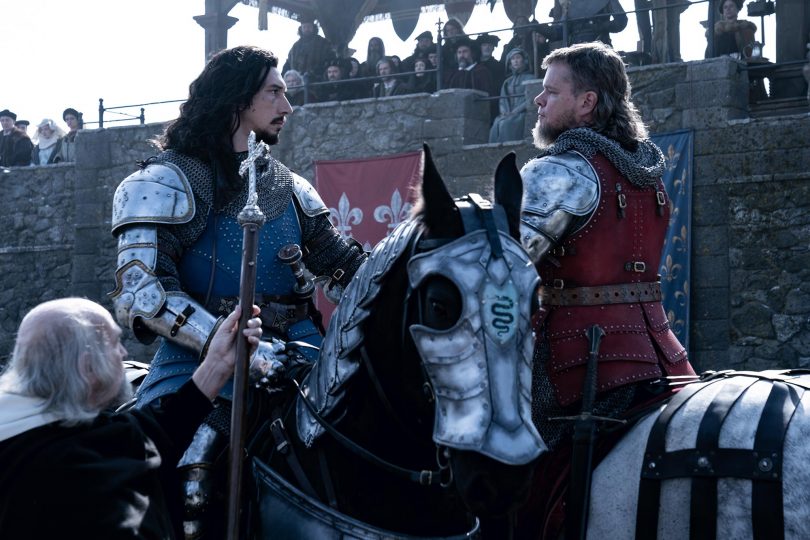Ridley Scott’s “The Last Duel” (R, 152 minutes, in theaters starting Oct. 14) could have been called “Dueling A-holes.”
Neither of the combatants in the titular duel is exactly hero material.
Knight Jean de Carrouges – played by Matt Damon with a distracting medieval mullet and patch of fuzz on his chinny, chin, chin – has courage on the battlefield. But he’s a bit of a dimwit whose obsession with perceived slights to his honor has made him a joke to those in power.
Squire Jacques Le Gris – played by Adam Driver with a convincing flowing black mane – appears more reasonable, and is much more learned and sophisticated, than former best pal Sir Jean. But he’s a bit of a weasel who knows how to play the political game to get ahead, often at the knight’s expense.

Mane vs. Mullet: Jacques Le Gris (Adam Driver, left) and Jean de Carrouges (Matt Damon) prepare for battle in “The Last Duel.” (20th Century Studios)
Things come to a head – and lead to the duel – when Sir Jean’s wife, Marguerite (Jodie Comer), accuses Jacques of raping her.
Exactly what happened is a matter of perception. Screenwriters Damon, Ben Affleck and Nicole Holofcener and director Scott take a “Rashomon” approach, in that they repeat key moments related to the history of the three characters to present the points of view of Sir Jean, then Jacques and, finally Marguerite. To reveal the differences in their views would give too much away, but it’s safe to say the egocentricity of both men plays a huge part in the wife’s suffering. And that’s why, by the film’s end, we’re almost rooting for both men to lose their battle to the death.
Almost. There are compelling reasons for wanting one duelist to triumph over the other.
Based on a true story, this is a strange film with mixed results. The bloody, climactic duel provides a satisfyingly intense payoff (especially since we’re genuinely unsure of how it will end), but the buildup suffers from uneven pacing.
At first, the story leaps forward over several years like a Middle Ages highlight reel. Later, this cursory approach is replaced, and greatly slowed down, by the “Rashomon” emphasis of repeating sequences through different perspectives. Whether going too fast or too slow (to say nothing of forcing the moviegoer to sit through a rape scene twice), these choices only serve to keep the moviegoer at a distance.
Then there’s the hair. Not only is Damon’s mullet borderline comical, but his buddy Affleck, as Jacques’ supporter and fellow orgy enthusiast Count Pierre d’Alencon, sports a blond bowl cut that makes him look like Ben Stiller’s “Tropic Thunder” character Simple Jack.
Despite this, Affleck manages a convincing performance as the cynical source of much of Sir Jean’s frustration. The best performance, though, is turned in by Comer, who easily could have fallen into the trap of playing Marguerite as mere victim but instead portrays her as a complex woman trying to survive an impossible situation.

Jodie Comer gives the most compelling performance as Marguerite de Carrouges. (20th Century Studios)
——
It’s Comer’s Margueritte and the character’s circumstances that stick with you after the film. “The Last Duel” initially can be a turnoff because the duelists, themselves, are both so surprisingly unappealing. On reflection, though, you realize that this is essential to the whole point of the film – that, from the woman’s view, whether in the 1300s or, perhaps, now, when men clash in matters of “honor,” it’s not always a matter of hero and villain, but the lesser of two evils. **½ (out of four)
** Click here for Tim Miller’s previous movie columns for Cape Cod Wave **
Please like Cape Cod Wave on Facebook.
Cape Cod Wave Magazine covers the character & culture of Cape Cod. Please see our Longform stories.
Tim Miller is a Cape-based member of the Boston Society of Film Critics. He and Tony Raine host “Tim ’n’ Tony’s Rock ’n’ Pop Show” from midnight to 2 a.m. Sunday nights/Monday mornings on WOMR (92.1-FM), WFMR (91.3-FM) and womr.org (archived shows at https://womr.org/schedule/broadcast-archive/). He also teaches film at Cape Cod Community College in West Barnstable. You can contact Tim at [email protected] or follow him onTwitter @TimMillerCritic. Or you can ignore him completely.

































